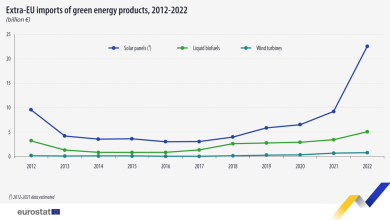Ukraine and the Challenge of Trust

At the UN climate conference, COP26, held in Glasgow two weeks ago Ukraine made a number of important contributions.
- President Zelensky confirmed Ukraine’s target of being climate neutral by 2060 and pledged to reduce greenhouse gas emissions by 65 per cent from a 1990 baseline by 2035.
- Ukraine was one of 23 countries joining an international move to phase out the use of unabated coal – a big step for a country with a long record of reliance on coal for use in industry and power generation.
- Ukraine also joined 140 other countries committing themselves to sustainable land use, with the President noting the environmental damage being done as a result of the occupation of Crimea and the conflict in parts of the Ukrainian Domas which he described as ‘eco bombs’.
Climate campaigners will always want more progress more quickly, but the announcements made confirmed a clear direction of change which would have been unthinkable five years ago.
To western friends of Ukraine, and independent observers including potential investors, the announcements confirmed not only that Ukraine is serious about climate change but also committed to its relationship with the European Union. Also, it is determined to create a modern clean economy and to be a partner in global cooperation for change.
This positive view is very important for a country which needs western allies in the face of Russian aggression and threats, and which needs international investment has since been seriously damaged by the decision of President Zelensky’s government to break its commitment to producers of renewable energy. In a statement issued on 17 November 2021, the Ukrainian Guaranteed Buyer – a state-controlled agency – intervened in the normal, legally determined distribution of green bond proceeds by withholding due payments from companies which had invested in wind and solar projects. Those affected included the European Bank for Reconstruction and Development, which invested over $100m.
This might seem an issue of interest only to the commercial companies and banks directly involved but that is not the case. Support for Ukraine, particularly from investors, depends on the country’s respect for the rule of law. However, the failure to respect contractual agreements is common in many countries which were part of the Soviet Union.
To be successful, Ukraine needs to be different.
Investors, particularly investors in renewable energy, have many choices. Almost every country in the world wants to develop wind, solar and hydrogen energy supplies, with all the associated infrastructure involved. Almost every country is offering investors incentives to bring their technology and experience. Resources are finite and those making the choices tend to automatically exclude the countries whose word they do not trust.
If Ukraine acts arbitrarily, breaking its word to those who have invested in the past, it stands no chance of being regarded as a suitable place in which to do business. Without investment, the pledges given in Glasgow and the fine words expressed by President Zelensky will mean nothing. Ukraine is in danger of being left with an energy mix which does not match it ambitions, the EU’s expectations, nor the expectations of other major trading partners.
Even more seriously, if Ukraine breaks contracts and disregards the importance of the rule of law, it will never win the support from Western countries in necessary to sustain Ukrainian independence. Why would the West spend time or money protecting a country which had reverted to the old ways?
This comes at a delicate moment. UK Prime Minister Boris Johnson recently talked about the importance of “sticking up for Ukraine”. President Macron speaking in Paris said that France was “ready to protect Ukrainian territorial integrity against Russia aggression”. That support is genuine. No one wants to see Ukraine slip backwards into Moscow’s sphere of influence.
But that support is not automatic or unconditional. The major countries in Europe will only use their diplomatic power to protect Ukraine if Ukraine is worth protecting.
In the last few days in London, I have heard Ukrainian supporters, who want to see Ukraine on the world stage, being very concerned about the misuse of the Ukrenegro Bonds and casting doubt on the credibility of anything said in Glasgow.
Ukraine is at a critical moment in its existence as an independent sovereign state. Events in Glasgow suggested that the country had made a critical choice to modernise and to be part of Europe.
But events in Kyiv since then have suggested that such a choice has not yet been made. Or, perhaps worse, that President Zelensky and his government do not understand how fundamental the rule of law and the respect of contracts is to the European Union and other Western countries.
The President has the opportunity, now, to put things right. But he has to move rapidly and unequivocally to reclaim his credibility.






